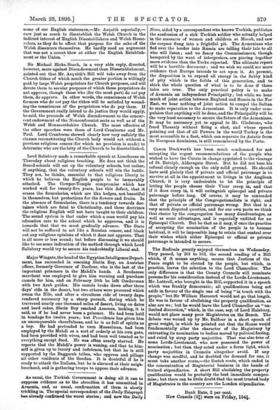The Radicals greatly enjoyed themselves on Wednesday. They passed, by
201 to 163, the second reading of a Bill which, if it means anything, means that Justices of the Peace ought to be elected by the people, but which, in practice, leaves the selection to the Lord Chancellor. The only difference is that the County Councils will nominate persons for his consideration instead of the Lords-Lieutenant. Mr. Luttrell, who brought in the Bill, supported it in a speech which was frankly democratic; all qualifications being set aside in favour of the single one of being "in touch with the people," but Sir William Harcourt would not go that length. He was in favour of abolishing the property qualification, as also are we; but he would leave the Lord Chancellor an "tin- limited discretion," which, in the case, say, of Lord Halsbury, would not place many poor Magistrates on the Bench. The debate was wound up by Mr. Balfour in a short speech of great weight, in which he pointed out that the House would fundamentally alter the character of the Magistracy by entrusting its nomination to bodies moved by political feeling, and ruled by stray party majorities. That was also true of some Lords-Lieutenant, who now possessed the power of nomination ; but then they acted under a fierce light, which party majorities in Councils altogether avoid. If any change was needful, and he doubted the demand for one, it must take another route,—the Scotch route, which ended in the concentration of Magisterial business in the hands of trained stipendiaries. A short Bill abolishing the property qualification would be probably the best immediate compro- mise; but there can be little doubt that the most trusted body of Magistrates in the country are the London stipendiaries.






































 Previous page
Previous page